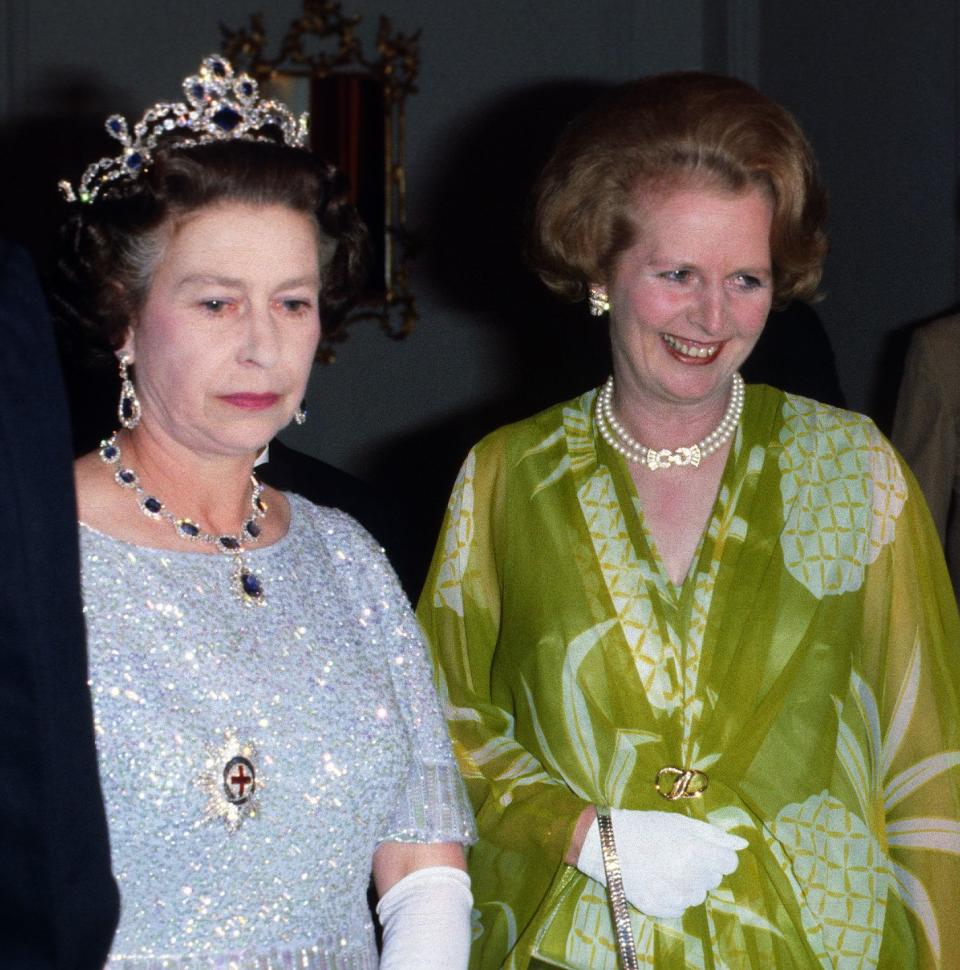The Queen Really Did Condemn Margaret Thatcher's Position Over Apartheid Sanctions in South Africa

Though much of The Crown season 4 focuses on the turbulent relationship between Prince Charles and Princess Diana, an equally compelling push-and-pull emerges between Queen Elizabeth and Margaret Thatcher. The ideological tension between the queen and Britain's first female prime minister comes to a head in episode 8, "48:1," which sees Queen Elizabeth taking the uncharacteristic step of publicly rebuking Thatcher over her handling of apartheid in South Africa. Did this really happen? Read on for the true story.
What was Margaret Thatcher's controversial stance on apartheid?
Throughout the 1980s, public opposition to apartheid—the South African political system built upon systemic racial segregation—had mounted to the point where political action needed to be taken. In 1986, the leaders of the Commonwealth nations came together to agree on a program of economic sanctions against the South African government in opposition to apartheid. Forty-eight of the 49 nations all signed off on a plan. The one holdout? Britain.
According to BBC History magazine, prime minister Margaret Thatcher had a blanket opposition to economic sanctions of any kind, believing they would not achieve their goal and would "damage Britain's extensive economic interests," per The Times; BBC History writes Thatcher viewed them as "a crime against free trade." It probably won't come as a surprise to U.S. readers that President Ronald Reagan agreed with Thatcher on this point. But the BBC also suggests that Thatcher's opposition to sanctions did not mean she supported apartheid. According to historian Dominic Sandbrook, who is quoted by the magazine, Thatcher "gave the country’s leaders quite a lot of grief behind the scenes, including telling them to release Nelson Mandela. She told the South Africans that Britain didn’t like the system and that it had to change. But because she refused to condemn it publicly, people assumed it must be because she secretly supported them.”

Did the queen publicly criticize Margaret Thatcher over her refusal to support the sanctions?
This particularly dramatic moment in The Crown is absolutely true. Following their face-to-face argument about the sanctions (this confrontation most likely didn't happen in real life), the queen is so disturbed by Thatcher's refusal to back the plan that she takes matters into her own hands. Aside from her concern about Britain being on the wrong side of history regarding apartheid, the queen is also concerned with the future of the Commonwealth itself, which she holds dear. The optics of Britain being the one holdout are so bad that they could have a real impact on the future of the union, or at least her own position as its leader. In real life, documents declassified in 2017 show the queen was so incensed over Thatcher's position, she considered cancelling one of their weekly meetings.
In The Crown, a farcical back-and-forth in which Thatcher refuses to sign numerous versions of the Commonwealth nations' statement and quibbles over petty word choices is depicted. Then, the Sunday Times releases a bombshell article which amounts to a public rebuke from the queen. Although QE2 herself is not directly quoted, the article claims that the queen is "dismayed" by Thatcher's lack of compassion for the people of South Africa, and quotes an anonymous palace aide as the source. This exact article really did run in the Sunday Times on July 20, 1986, per The New York Times:
The Queen has been described in recent press reports as worried that Mrs. Thatcher's firm opposition to sanctions threatened to break up the 49-nation Commonwealth.
The Queen reportedly also believes that Mrs. Thatcher's Conservative Party Government lacks compassion and should be more caring toward less privileged members of society, The Sunday Times said.
But The Crown's depiction takes more liberties from here on out. In the show, things remain tense between the queen and PM after the article, whereas in real life the Queen reportedly apologized to Thatcher over the article. According to The Times, Thatcher was "desperately hurt" by the accusation that she was uncaring, and the mortified queen phoned her with a denial, stating she “could not imagine how the story came to be circulated, and anyway it bears no relation to the truth as I understand it…”
Was Michael Shea really the source?
In real life, just like in the show, the source of the bombshell Sunday Times story is palace press secretary Michael Shea—and in real life, he really did resign shortly after the article was published. In the show, Shea is essentially thrown under the bus by the palace and specifically by the queen's private secretary, Martin Charteris (who in real life had retired by this time). It's not clear that Shea was pushed out in reality.
The article prompted "a hunt for a Palace 'mole,'" per The Independent, and it didn't take long for Shea to be identified. "The palace publicly stood by Shea, but his days were numbered," the paper added. As MPs began calling for his resignation, Shea stepped down in 1987, but "maintained that he had not been guilty of any indiscretion."
You Might Also Like

